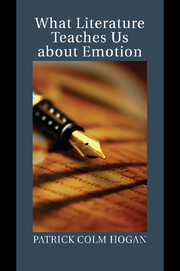Book contents
- Frontmatter
- Contents
- List of Figures
- Acknowledgments
- Introduction: Studying Literature Studying Emotion
- 1 Fictions and Feelings
- 2 What Emotions Are
- 3 Romantic Love
- 4 Grief
- 5 Mirth
- 6 Guilt, Shame, Jealousy
- 7 From Attachment to Ethical Feeling
- 8 Compassion and Pity
- Afterword: Studying Literature Shaping Emotion
- Works Cited
- Index
- Title in the series
8 - Compassion and Pity
The Tempest and Une Tempête
Published online by Cambridge University Press: 03 May 2011
- Frontmatter
- Contents
- List of Figures
- Acknowledgments
- Introduction: Studying Literature Studying Emotion
- 1 Fictions and Feelings
- 2 What Emotions Are
- 3 Romantic Love
- 4 Grief
- 5 Mirth
- 6 Guilt, Shame, Jealousy
- 7 From Attachment to Ethical Feeling
- 8 Compassion and Pity
- Afterword: Studying Literature Shaping Emotion
- Works Cited
- Index
- Title in the series
Summary
Ethics against Adaptation
Feeling for others is ubiquitous in everyday life. We cringe when we see someone mildly injured, become teary when we hear of someone's joy or suffering, experience a sort of terror when we read about barbarous events that occurred in the distant past. As many writers have noted, it is not intuitively obvious why this should be the case. The straightforward evolutionary function of emotion is egoistic. Fear, for example, leads me to flee situations (e.g., being eaten by a predator) that would threaten my ability to reproduce. My feelings for others, however, sometimes actually work against this function. For example, I may become so concerned about someone else being eaten by a predator that I do not flee, but stay and help him or her – perhaps getting myself eaten in the process. The “selfish gene” idea helps explain this for kin. If I save relatives, then I am preserving some shared genetic material. But what about when someone risks their life for strangers?
The fact of feeling for strangers is perhaps not as difficult to account for in evolutionary terms as it might initially seem. In order to understand why, we need to return to a point stressed earlier: The biological mechanisms produced by evolution merely approximate functions; they are not identical with functions. In some ways, the point is obvious within evolutionary theory.
- Type
- Chapter
- Information
- What Literature Teaches Us about Emotion , pp. 257 - 286Publisher: Cambridge University PressPrint publication year: 2011



